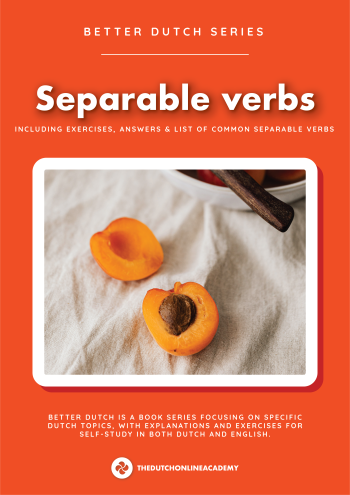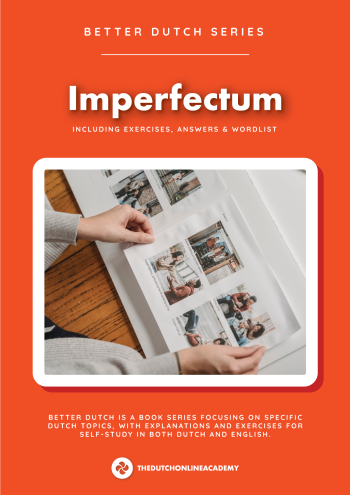Learn the theory
Weten or Kennen in Dutch?
Weten versus kennen in Dutch. The difference seems a mystery, but there is logic behind it. If you know Spanish or Portuguese or maybe another Roman language, we have good news: these languages also have two words for "to know" (in Spanish conocer y saber, for example). But if you translate from English, it might be handy to read on.
1. There is a grammatical difference between weten and kennen
If you ask Dutch people about the difference between kennen and weten many will focus on the second difference (see below), but the grammatical difference is probably way easier to grasp.
- Kennen needs a direct object.
- Weten can be combined with a subordinate clause.
Kennen
- Ik ken Piet.
- I know Piet.
- Wij kennen dit liedje.
- We know this song.
- Ken jij dit boek?
- Do you know this book?
- Petra kent dit kledingmerk niet.
- Petra does not know this clothing brand.
- Ik ken zijn ouders.
- I know his parents.
Weten
- Ik weet wie Piet is.
- I know who Piet is.
- Wij weten waar dit liedje over gaat.
- We know what this song is about.
- Weet jij of dit boek leuk is?
- Do you know if this book is fun?
- Petra weet niet welk kledingmerk dit is.
- Petra doesn't know which clothing brand this is.
- Ik weet dat zijn ouders in Utrecht wonen.
- I know that his parents live in Utrecht.
As you can see, weten can be combined with an extra sentence. If you would like to read more about subordinate clauses, like in indirect speech, read more here.
Note that weten can also be combined with a direct object like kennen (but not the other way around: you can't use kennen with a subordinate clause).
2. There is a difference in meaning
Kennen means you are familiar with something. You might have heard something before or you might have seen someone before. Weten on the other hand is more focused on factual knowledge based on cognitive processes. Let's look at an example.
Let's say someone tells you a riddle. You have to guess the answer. You say:
- Ik ken het antwoord al.
- I know the answer already.
Saying this would indicate that you have heard the riddle before. You are familiar with the answer: it is not new.
You could also say:
- Ik weet het antwoord al.
- I know the answer already.
This would probably mean that you already figured out the answer. This could be based on information you heard before (close to kennen) but you could also have figured it out all by yourself.
As you can see there is a grey area with overlap. In some cases, you could both use kennen and weten, because the difference doesn't really matter.
- Ik weet de weg / Ik ken de weg.
- I know the way.
- Ik weet zijn naam / ik ken zijn naam.
- I know his name.
But if it comes to knowing a person, it is always kennen and if it is about factual knowledge or cognitive processes, it is normally weten.
- Jij kent deze band al.
- You know this band already.
- Kennen jullie mijn broer?
- Do you know my brother?
- Zij weet alles!
- She knows everything!
- Wat is de hoofdstad van Chili? Ik weet het niet.
- What is the capital of Chile? I do not know.
Eager to learn more? Why not take a look at the difference between alleen, maar en pas?
Practice with exercises
__Kennen or weten? __
- Ik … wie de organisatie heeft opgericht.
- Jij ... Peter niet, toch?
- ... jij hoe je papieren vliegtuigjes moet vouwen?
- Ik ... dit gedicht uit mijn hoofd!
- Dit is mijn favoriete band, ik … al hun nummers.
- Ik … niet wat ik moet doen. Kun je me helpen?
- Mijn oma … het hele dorp!
- ... je waar de dichtstbijzijnde supermarkt is?
- ... je waar het station is?
- Ik durf niet in het Verenigd Koninkrijk te rijden. Ik ... de verkeersregels daar niet.
- Ik ... al hoe dit moet! Je hoeft me dit niet uit te leggen.
- Misschien … Karel hoe we dit het beste kunnen aanpakken.
- Ik ... dit liedje! Wie zingt dit ook alweer?
- Ik ... wat dit woord betekent.
- Ik ... dit woord.
Solutions
__Kennen or weten? __
- Ik weet wie de organisatie heeft opgericht.
- Jij kent Peter niet, toch?
- Weet jij hoe je papieren vliegtuigjes moet vouwen?
- Ik ken/weet dit gedicht uit mijn hoofd!
- Dit is mijn favoriete band, ik ken al hun nummers.
- Ik weet niet wat ik moet doen. Kun je me helpen?
- Mijn oma kent het hele dorp!
- Weet je waar de dichtstbijzijnde supermarkt is?
- Weet je waar het station is?
- Ik durf niet in het Verenigd Koninkrijk te rijden. Ik ken/weet de verkeersregels daar niet.
- Ik weet al hoe dit moet! Je hoeft me dit niet uit te leggen.
- Misschien weet Karel hoe we dit het beste kunnen aanpakken.
- Ik ken dit liedje! Wie zingt dit ook alweer?
- Ik weet wat dit woord betekent.
- Ik weet/ken dit woord.
comments
Login to leave a comment


![Learn Dutch with The double infinitive in Dutch [list of auxiliary verbs included]](https://images.ctfassets.net/f8l4gy5qxe00/7fpaN2iBE3h1xS7LRL8c0h/3bbebedc080cbf7eece73424c8e3918f/The_double_infinitive.png?w=350&h=495&q=50&fm=png)
